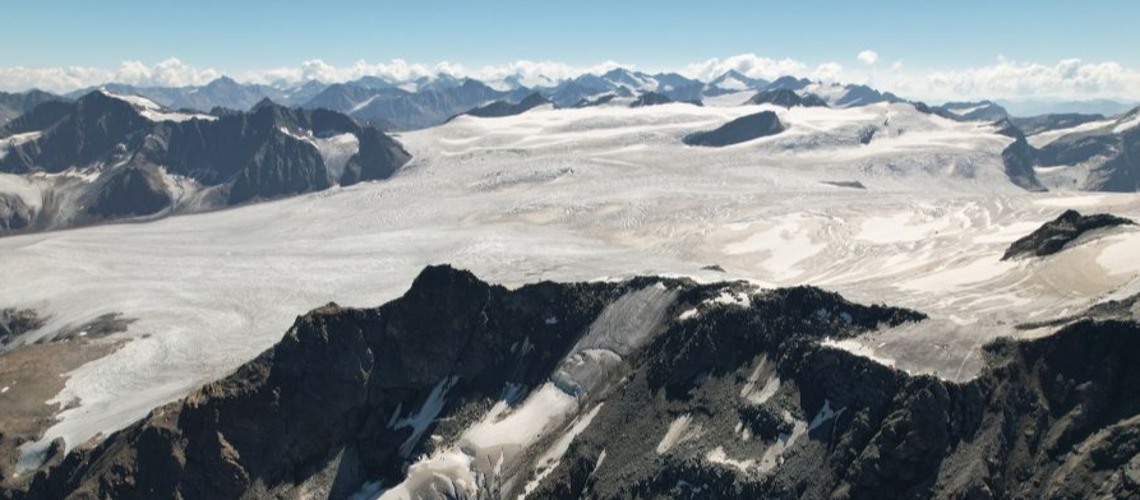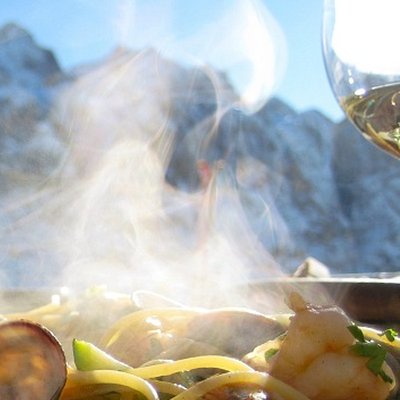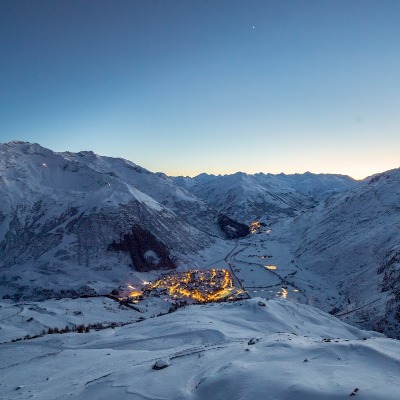International Alliance Calls For Respect For The Alps

A unique alliance of the Alpine clubs from Austria, Germany and South Tyrol, together with numerous other nature conservation organizations and citizens' movements, is urgently calling for more respect for the alpine region. At a press conference in the middle of the Kaunertal mountains, the organizations are appealing for the removal of exceptions such as those found in the Tyrolean cable car and ski area program and the Tyrolean glacier protection program.
"The Alps have rarely been under as much pressure as they are now," explains Wolfgang Schnabl, President of the Austrian Alpine Association, at a press conference in the middle of the Kaunertal mountains, a "hotspot" when it comes to plans for expansion that destroy nature. "Developments and construction are endangering the last untouched ecosystems in our mountains - political decision-makers must urgently rethink this. We demand more respect for the Alps!" The Alpine associations from Austria, Germany and South Tyrol and other environmental organizations such as Global 2000, WWF Austria, the umbrella environmental association, the Friends of Nature Austria and local citizens' movements are behind this demand.
“Climate and species protection must go hand in hand”
Under the guise of the energy transition, TIWAG is currently planning to flood and thus destroy the Platzertal as part of the expansion of the Kaunertal power plant. This is where the largest untouched moor and wetland complex in the Austrian high Alps is located*. Moors store more carbon dioxide than any other ecosystem in the world and are habitats for specialized species. "Climate and species protection must go hand in hand. But the project is blind in one eye and must therefore be stopped immediately," says Schnabl.
Absurd exceptions
A few kilometers from the Platzertal, the completely natural Gepatschferner around the Weißseespitze is to be developed. Such plans are made possible by absurd exceptions in the so-called glacier protection program, which was decreed to exempt certain areas from this protection. "Large-scale ski area expansions, such as those planned in the Kaunertal and also in the Pitztal, are a clear red line for us. We are committed to the abolition of the exceptions and the restoration of absolute glacier protection, as enshrined in the Tyrolean Nature Conservation Act," explains Schnabl.
“Nobody wants to walk through industrial landscape”
"A glacier is not just ice and a glacier foreland is not just rubble," explains DAV Vice President Wolfgang Arnoldt and emphasises: "These are valuable natural and living spaces. We cannot turn a blind eye to this, they simply must not be developed." With the two glacier developments in the Pitztal and Kaunertal ski areas, further alpine natural areas would be destroyed and deprived of their soul. Both regions are of particular importance for mountain sports: the Gepatschferner is part of the largest contiguous glacier area in Austria and, with the Brandenburger Haus and Rauhekopfhütte bases, is a popular (ski) mountaineering area. The Braunschweigerhütte in the Pitztal is located directly on the popular European long-distance hiking trail E5 and is an important training base for the Alpine Association. "Mountaineering in all its facets, the huts, our training, our commitment to the alpine trail network - all of this offers the best conditions for sustainable and gentle tourism. The permanent construction sites that these developments would bring us would destroy this. Nobody wants to walk through an industrial landscape,” warns Arnoldt.
Manifesto for more respect for the Alpine region
As early as 2022, the Alpine clubs from Austria, Germany and South Tyrol as well as the Club Alpino Italiano, together with the umbrella organization for nature and environmental protection in South Tyrol and the South Tyrol Heritage Association, signed the so-called "Manifesto for more respect for the Alpine region". This manifesto reaffirms the need for serious protection of the Alpine region. "The development of the Alpine region is complete," the manifesto states. "With the 'Manifesto for more respect for the Alpine region', we see it as our duty, together with the Alpine clubs and various environmental organizations, to put a stop to the recurring demands of certain business circles for the further development of our Alps. Enough has been developed, and our children also have the right to find nature that is still somewhat intact," emphasizes Georg Simeoni, President of the South Tyrol Alpine Association.
In this context, Simeoni also addresses the merger between the Kaunertal and the South Tyrolean Langtauferertal: Since there is no ski area in the Langtauferertal, the plans to merge with the Kaunertal are tantamount to new development. The South Tyrol Alpine Association is counting on the South Tyrolean government to stick to its negative stance and put a stop to the project once and for all. "The development of new areas in the high mountains is taboo for us. At the same time, however, we say yes to new, environmentally friendly perspectives for the Langtauferertal," says Simeoni.
Further statements from the organizations:
- GLOBAL2000 "The people of Tyrol urgently need an environmentally friendly energy transition that will quickly put Tyrol on the path to climate neutrality by 2040 and ensure affordable domestic energy. An ancient project such as the planned expansion of the Kaunertal power plant would be an expensive and too slow diversion from this direction, because not only will an ecologically valuable moorland area be destroyed, but huge amounts of taxpayers' money will also be invested in an unprofitable project," says Viktoria Auer, climate and energy spokesperson at GLOBAL 2000. "TIWAG and its owner, the Tyrolean state government, must finally present a sustainable strategy for climate neutrality by 2040 - and invest in known alternatives and the expansion of modern renewable energies that are not only cheaper but also more environmentally friendly."
- WWF Austria "While large-scale renaturation is being discussed throughout the EU, Tiwag and the Tyrolean state government are sticking to the massively environmentally damaging and completely outdated expansion of the Kaunertal power plant. After the end of the water diversions from the Ötztal, this mega project no longer makes any sense for the energy transition. Governor Anton Mattle must stop this senseless destruction of nature as quickly as possible and push for sustainable alternatives. We are also clearly opposed to the expansion of the glacier ski area in the Kaunertal, because in times of climate and biodiversity crisis we need the last alpine open spaces as alternative spaces for animal and plant species," says WWF water protection expert Bettina Urbanek.
- Environmental umbrella organization "The land-consuming mega-projects in Tyrol are dramatic examples of the country's one-sided and outdated (energy) policy - because the expansion of the power plant and the extension of the ski area in Kaunertal cannot be implemented in a way that is compatible with nature. They endanger the last ecologically intact rivers and streams and would have fatal consequences for highly sensitive ecosystems and the countless animal and plant species that live there. What we need is not a new mega-project, but energy efficiency, the modernization of existing systems, the expansion of photovoltaics on areas that have already been built on and - in terms of tourism - a reorientation towards sustainable year-round tourism that does not require new technical developments or the destruction of nature," says Franz Maier, President of the environmental umbrella organization.
- Club Arc Alpin. Dr. Nicole Slupetzky, President of Club Arc Alpin and Vice President of the Austrian Alpine Association: "The Alpine Convention is an international treaty that aims to protect the Alps in the long term and keep them livable. The Club Arc Alpin represents the eight clubs around the Alpine arc and has the official observer role to ensure compliance with this treaty. The Alps are under pressure in all countries, not only because of climate change, which is particularly affecting the Alpine region, but above all because humans are not stopping making massive interventions. It is in the public interest to stand up for the protection of Alpine nature. The CAA is therefore also calling on Austria to adhere to the Alpine Convention and prevent further interventions."
- Nature Friends Austria Dr. Birgit Sattler, Deputy Chairwoman of Naturfreunde Tirol: "The Alpine Convention states that the limits of the adaptability of ecosystems in the Alpine region must be observed. Some of these ecosystems have already exceeded the limits, so we would like to see more concessions for these highly sensitive ecosystems, which must not be further damaged by irreversible interventions. The Alpine region needs a consistent application of this Alpine Protection Convention - especially in the area of glacier protection."
- WET - Preserving whitewater in Tyrol Marieke Vogt, WET - Preserving whitewater in Tyrol: "In addition to the climate crisis, we are confronted with an enormous extinction of species. The expansion of hydropower is no longer about "making sacrifices for the energy transition", because nature and the people affected are at their limit. Instead of continuing to destroy rivers and valleys on a large scale, as with the expansion of the Kaunertal power plant, Tyrol must first get its increasing energy consumption under control."
- Protect Alpine Nature - PAN. Philipp Tschaikner, Network Coordinator, Protect Alpine Nature – PAN:
“Protect Alpine Nature is currently an association of 15 NGOs, citizens' initiatives and environmental organizations. We founded our network because we see increasing pressure on the remaining natural landscapes throughout the Alps. Together we are a strong voice against destructive projects such as those planned here in Kaunertal, but unfortunately also in many other regions of the Alps.” - Protect Our Winters Austria POW Verena Stahl, President, Protect Our Winters Austria POW: “We live in the midst of a climate and biodiversity crisis. This makes it all the more important to preserve the Kaunertal as one of Austria's last natural landscapes. In order for such places to be protected and rebuilt in the future, the Renaturation Act is needed at EU level. The resulting funding enables the long-term protection and sustainable management of the alpine areas.”
- Mountain Wilderness Germany Michael Pröttel, Chairman, Mountain Wilderness Germany
“It is unbelievable that this incomparable glacial wilderness should be destroyed!” - Malfon Action Group Silvia Matt, Malfon Action Group “We will not give up our last unspoilt valleys and our water for the profit fantasies of the cable car industry or for selling off on the electricity exchange.”
- Association for the Protection of the Mountain World Dr. Sabine Rösler, 1st chairwoman of the Association for the Protection of the Mountain World, on the projects “Ski area expansion to Weißseespitze” and “Expansion of the Kaunertal power plant with a new pumped storage plant in Platzertal and the diversion of the Venter Ache, Gurgler Ache as well as Ferwall- and Königsbach torrents into the Gepatsch reservoir”: “The transformation from fossil to renewable energies is necessary for climate protection. Climate protection and species protection are, however, inextricably linked. The expansion of renewable energies also requires particular attention to nature and the landscape in order not to miss the goal of sustainability. The diversion of the Venter Ache, Gurgler Ache as well as Ferwall- and Königsbach torrents and the sinking of the unique Platzertal and its valuable moors beneath a huge storage basin makes a mockery of this objective. The same goes for the idea of opening up the Gepatschferner, together with the Kesselwandferner the largest glacier area in Austria, at over 3000 meters, for skiing: This is a slap in the face of future generations, who will only have pitiful remnants of glaciers left anyway due to man-made climate change, if at all. This project, if it were to be realized, would be the symbol of a ruthless society for whom quick profit is more important than a prosperous future. A new edition of the TSSP (Tyrolean Cable Car and Ski Area Program) must therefore once again place absolute glacier protection at the forefront in order to make such cynical projects impossible."
- South Tyrol Heritage Association "The development of the Alpine region is complete," is the central sentence in the joint manifesto of the Alpine clubs and environmental associations. This means that new developments, such as those planned for the expansion of the "Kaunertal Glacier" ski area, must be a thing of the past in view of climate change, the biodiversity crisis and, above all, in view of our mission to guarantee wild mountains and intact natural and cultural landscapes for future generations. But even when expanding existing infrastructure, the first question that must always be asked is whether the measures are really necessary, or whether more resource-saving measures can be taken or perhaps even dismantling is possible. For the energy transition, this means that we do not need new mega-projects such as the expansion of the Kaunertal power plant, but energy efficiency, a smart use of existing resources and a moderate expansion of renewable energy sources, away from the already exhausted hydropower. Because we must be clear about one thing: one of the most important resources we still have in the Alpine region is the intact natural and cultural landscape, and once it is sealed and built on, it unfortunately does not grow back. So if we want future generations to be able to experience wild mountains, small-scale natural and cultural landscapes and intact ecosystems in the Alps, then "The development of the Alpine region is complete" must apply."
- Umbrella organisation for nature and environmental protection South Tyrol "The expansion of renewable energies is important, but holistic solutions are even more important: in the 20th century, entire villages and mountain valleys were flooded for industrial growth, and social communities and natural areas were destroyed. In order to achieve the energy transition today, we need first and foremost savings, then efficiency improvements and, last but not least, renewable energies. However, renewables must not come at the expense of people and nature, but must respect social and ecological demands without any ifs or buts."
*Source: WWF study: Schwienbacher 2023 High Alpine Moors (wwf.at)













